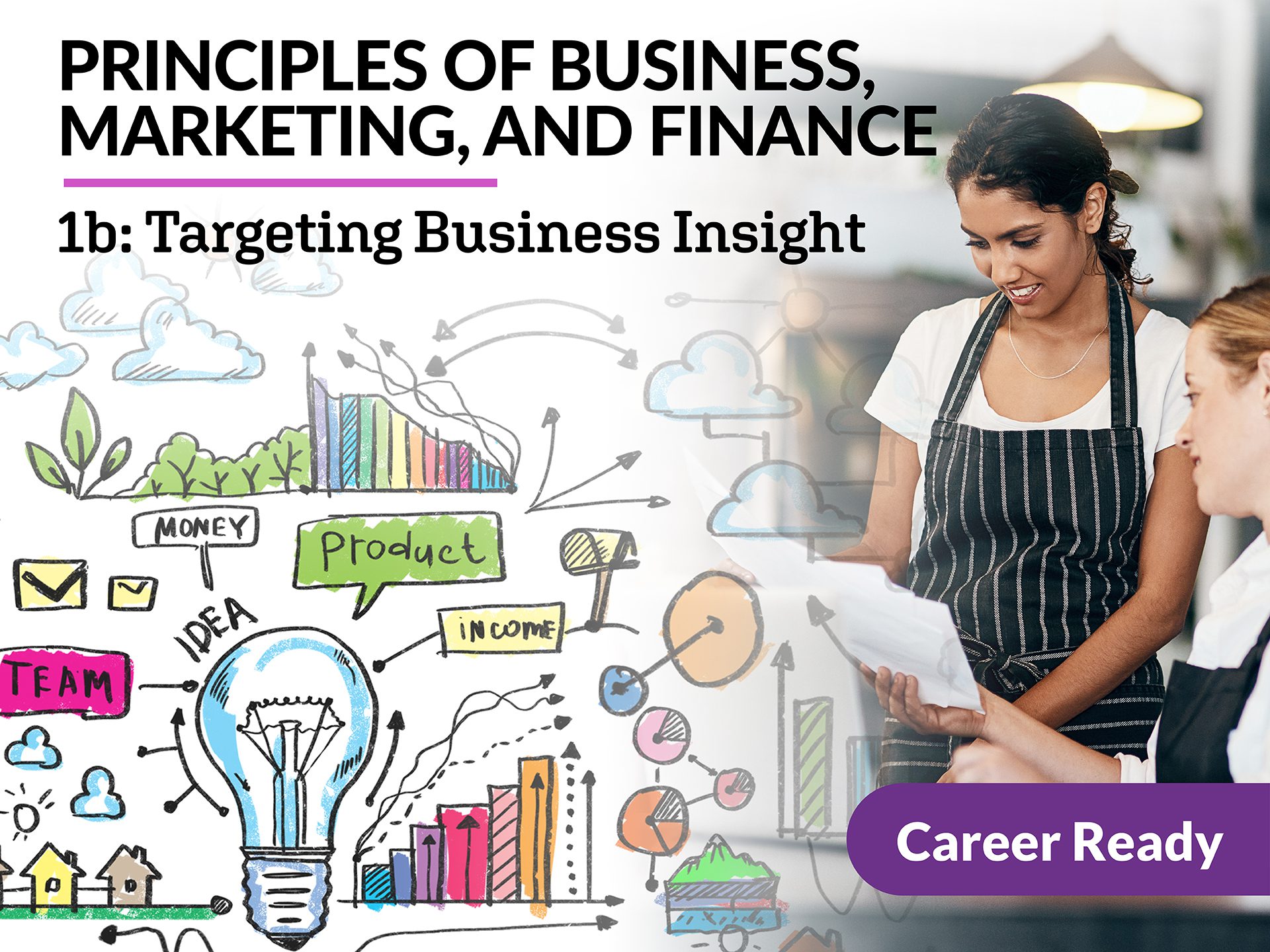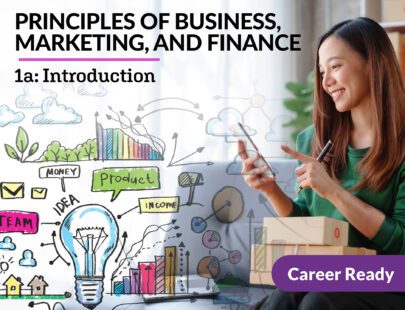
Principles of Business, Marketing, and Finance 1b: Targeting Business Insight
Get ready to learn about responsible business practices that challenge the status quo. Explore topics like marketing, finance, and running ethical businesses by analyzing the strategies of young entrepreneurs, such as Brian Chesky and Joe Gabbia, and Kylie Jenner. Every unit applies concepts to real-life practices through IRL features—Business IRL, Marketing IRL, Accounting IRL—to help you see the relevance of business principles. Follow the creation of Random Acts of Coffee, a fictional sustainable café with a pay-it-forward mission, as you devlop your own business ideas. By the end, you will complete a business plan with sections like financial projections and marketing strategies. This course can help you build a business that makes a difference—while preparing for future success!
Units at a Glance
Unit 1: Doing Business in the Global Marketplace
Get ready to embark on an exciting journey into the world of international commerce. In this unit, you’ll gain invaluable insights into the skills needed to thrive in this fast-paced, ever-evolving field. Whether you dream of leading a multinational corporation, launching your own global startup, or making your mark in international finance, this unit lays the foundation for an exhilarating career in global business. Prepare to broaden your horizons, sharpen your cross-cultural understanding, and position yourself at the forefront of the global marketplace!
What will you learn in this unit?
- Explain the benefits and impact of global trade on the US economy
- Describe the government’s role in regulating international business
- Discuss the importance of cultural sensitivity in global business
- Analyze how technology has transformed global business operations
Unit 2: Mastering the Marketing Mix
Are you ready to learn how businesses promote their products and grab people’s attention? From billboards to social media, you’ll see the different ways marketers reach their audience. You’ll also learn how companies change their methods when selling products compared to services. By the end of this unit, you’ll know how to create a strong marketing plan that attracts and engages customers online.
What will you learn in this unit?
- Understand the seven parts of the marketing mix and why they are important in business
- Compare traditional and digital marketing channels and their effectiveness in reaching consumers
- Develop a marketing strategy that matches business goals
- Differentiate between marketing for products and services
Unit 3: Targeting the Right Markets
In this unit, we’ll explore how businesses find and reach the right customers. You’ll learn how companies identify and group potential customers based on different characteristics. You’ll also discover how businesses adjust their products, services, and marketing strategies to meet the needs of specific customer groups. This will help you create better marketing campaigns and make informed business decisions based on research.
What will you learn in this unit?
- Understand market segmentation
- Apply various market research methods to gather and analyze customer data
- Evaluate market potential and identify opportunities using analytical tools
- Create and apply a detailed market segmentation strategy
Unit 4: Managing Business Finances
In this unit, we’re jumping into the world of business finance. We’ll explore everything from building good credit to understanding different types of funding. You’ll learn how businesses find investors, manage debt, and handle the cost of day-to-day operations. By the end of this unit, you’ll understand why a good credit score matters, how to choose between different funding options, and what financial responsibilities come with running a successful business.
What will you learn in this unit?
- Understand the importance of building and maintaining good personal and business credit ratings
- Explain the three functions of money and their role in a free enterprise system
- Evaluate alternative funding sources for businesses, including crowdfunding and bootstrapping
- Outline the key financial responsibilities of running a business, including expense tracking, investor repayment, and tax obligations
Unit 5: Crunching the Numbers
Ever wondered how businesses keep track of their money and stay successful? In this unit, you’ll explore the business accounting world and learn how to manage money like a pro. You’ll uncover the secrets behind reading financial statements, tracking expenses, and making smart financial decisions. Whether you’re dreaming of running your own business someday or just curious about how companies stay profitable, this unit will give you the skills to understand the numbers that make it all happen.
What will you learn in this unit?
- Identify the key differences between personal and business accounting, focusing on size, complexity, and purpose
- Explain how different accounting methods impact financial reporting and business decisions
- Classify different types of assets and liabilities and explain how they contribute to a business’s net worth
- Analyze the impact of business decisions on profitability, productivity, and performance using accounting tools
Unit 6: Managing Business Risks
In this unit, we explore how businesses prepare for unexpected problems and protect themselves when issues do arise. You’ll learn about different types of risks that businesses face and strategies to handle them. You’ll also discover how business insurance works. (It’s not just for cars and houses!) By the end of this unit, you’ll be able to spot potential problems before they happen and create a plan to deal with them.
What will you learn in this unit?
- Analyze different types of business risks and their potential impact on business operations
- Compare and contrast various risk management strategies businesses can employ to mitigate potential threats
- Evaluate the importance of different types of business insurance in protecting against financial losses
- Describe the key components of a comprehensive risk management plan for a small business
Unit 7: Business Law in Action
In this unit, you’ll uncover how laws shape the business landscape, protect workers and consumers, and keep our economy fair and competitive. From understanding antitrust laws that prevent monopolies to exploring labor laws that ensure safe workplaces, you’ll gain insights into the delicate balance between business growth and public protection. Discover how government agencies work to keep consumers safe, both in stores and online. By the end of this unit, you’ll have a solid grasp of the legal framework that guides businesses and protects us all.
What will you learn in this unit?
- Analyze the role of government and the legal system in regulating business practices and protecting public interests
- Evaluate the impact of antitrust laws and environmental regulations on businesses and the economy
- Examine the importance of labor laws in protecting workers’ rights and ensuring fair employment practices
- Assess the effectiveness of consumer protection laws and agencies in safeguarding consumer interests in both traditional and online marketplaces
Unit 8: Business as a Force for Good
In this lesson, we’ll explore the complex world of business ethics. We’ll examine the sometimes-blurred lines between legal and ethical, explore common ethical dilemmas, and learn how businesses can encourage ethical behavior. By the end, you’ll understand why ethics isn’t just about feeling good—it’s a critical factor in a company’s long-term success and impact on the world.
What will you learn in this unit?
- Differentiate between legal and ethical business practices
- Evaluate how businesses can apply environmental sustainability in their operations
- Understand how companies and communities engage in socially responsible business practices
- Identify ways businesses can strengthen relationships with local and global communities through charitable efforts
Required Materials
Physical
- Video recording device
Software
- Graphic design software
- Presentation software
- Spreadsheet software
- Survey tool
- Word processing program
Optional
- Art supplies
- Audio recording device
- Poster board
- Writing supplies




